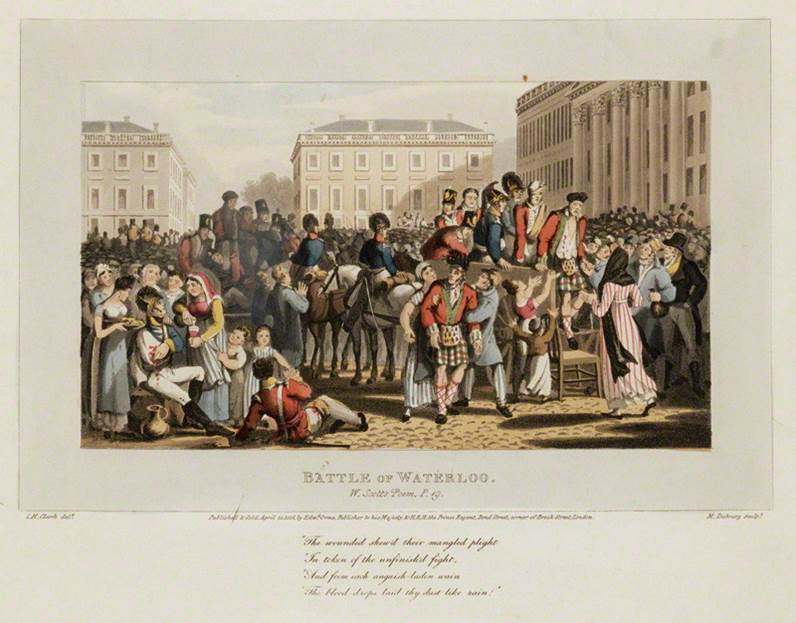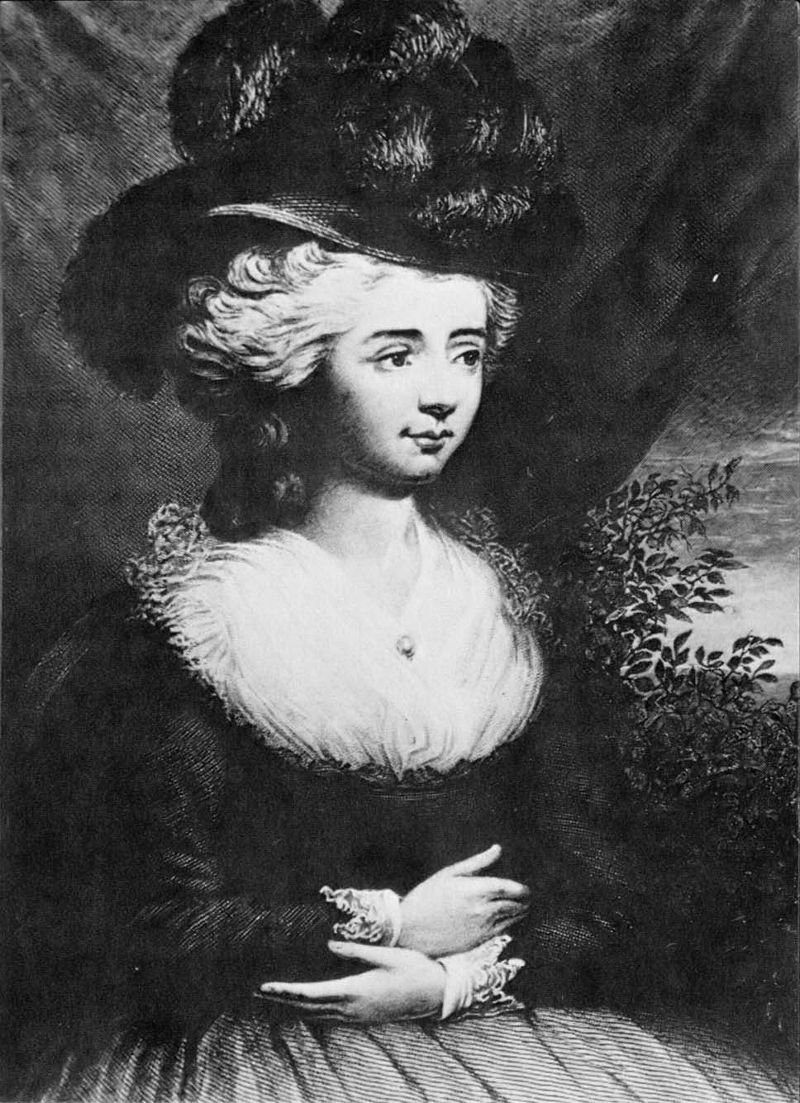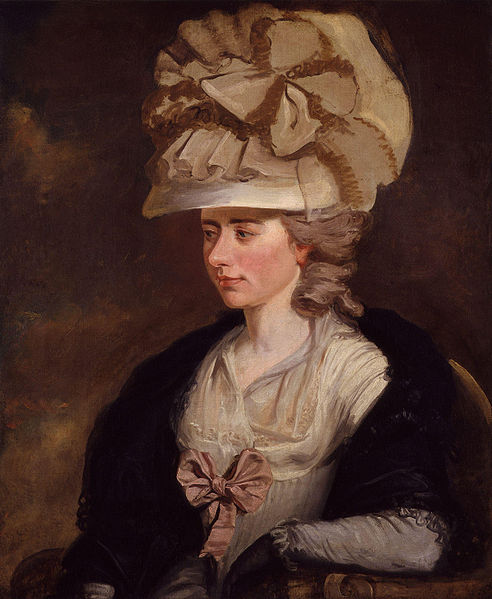In honor of the recent anniversary of the Battle of Waterloo, fought June 18, 1815, here is the second part of Fanny Burney’s (aka Madame d’Arblay ) experiences in Belgium. We take up Burney’s account of Brussels again on the day of the Battle of Quatre Bras.
“I was again awakened at about five o'clock in the morning Friday, 16th June, by the sound of a bugle in the March aux Bois: I started up and opened the window. But I only perceived some straggling soldiers, hurrying in different directions, and saw lights gleaming from some of the chambers in the neighbourhood: all again was soon still, and my own dwelling in profound silence, and therefore I concluded there had been some disturbance in exchanging sentinels at the various posts, which was already appeased: and I retired once more to my pillow, and remained till my usual hour…
(Later) “… my ears were alarmed by the sound of military music, and my eyes equally struck with the sight of a body of troops marching to its measured time. But I soon found that what I had supposed to be an occasionally passing troop, was a complete corps; infantry, cavalry artillery, bag and baggage, with all its officers in full uniform, and that uniform was black.... I learned it was the army of Brunswick. How much deeper yet had been my heartache had I foreknown that nearly all those brave men, thus marching on in gallant though dark array, with their valiant royal chief at their head, the nephew** of my own king, George III., were amongst the first destined victims to this dreadful contest, and that neither the chief, nor the greater part of his warlike associates, would within a few short hours, breathe again the vital air!...
Amidst reports on her conversations with those trying to escape, “I found upon again going my rounds for information, that though news was arriving incessantly from the scene of action, and with details always varying, Bonaparte was always advancing…Yet no clamour, no wrangling, nor even debate was intermixed with either question or answer; curiosity, though incessant, was serene; the faces were all monotony, though the tidings were all variety. I could attribute this only to the length of time during which the inhabitants had been habituated to change both of masters and measures, and to their finding that, upon an average, they neither lost nor gained by such successive revolutions…No love of liberty buoyed up resistance; no views of independence brightened their imagination; and they bore even suspense with the calm of apparent philosophy, and an exterior of placid indifference.”
These are just a few of her observations, but I have attempted to choose the most relevant ones. At last, we come to the day of the main battle.
Her friend Mr. Boyd “…feared all was lost-that Bonaparte was advancing-that his point was decidedly Brussels-and that the Duke of Wellington had sent orders that all the magazines, the artillery, and the warlike stores of every description, and all the wounded, the maimed, and the sick, should be immediately removed to Antwerp. For this purpose he had issued directions that every barge, every boat should be seized…”
“The dearth of any positive news from the field of battle, even in the heart of Brussels, at this crisis, when everything that was dear and valuable to either party was at stake, was at one instant nearly distracting in its torturing suspense to the wrung nerves, and at another insensibly blunted them into a kind of amalgamation with the Belgic philosophy. At certain houses, as well as at public offices, news, I doubt not, arrived; but no means were taken to -- promulgate it -- no gazettes, as in London, no bulletins, as in Paris, were cried about the streets; we were all left at once to our conjectures and our destinies.”
… “What a dreadful day did I pass! dreadful in the midst of its glory! for it was not during those operations that sent details partially to our ears that we could judge of the positive state of affairs, or build upon any permanency of success. Yet here I soon recovered from all alarm for personal safety, and lost the horrible apprehension of being in the midst of a city that was taken, sword in hand, by an enemy -- an apprehension that, while it lasted, robbed me of breath, chilled my blood, and gave me a shuddering ague that even now in fancy returns as I seek to commit it to paper.”
Eventually Burney heard an account from a witness to the battle; (Mr. Saumarez’s) “…narration was all triumphant and his account of the Duke of Wellington might almost have seemed an exaggerated panegyric if it had painted some warrior in a chivalresque romance. . . . I could not but be proud of this account: independent from its glory; my revived imagination hung the blessed laurels of peace. But though Hope was all alive, Ease and Serenity were not her companions: Mr. Saumarez could not disguise that there was still much to do, and consequently to apprehend; and he had never, he said, amongst the many he had viewed, seen a field of battle in such excessive disorder. Military carriages of all sorts, and multitudes of groups unemployed, occupied spaces that ought to have been left for manoeuvring or observation. I attribute this to the various nations who bore arms on that great day in their own manner; though the towering generalissimo of all cleared the ground, and dispersed what was unnecessary at every moment that was not absorbed by the fight.”
Though confident of victory, no one knew at the moment that for all practical purposes, Napoleon’s reign was over and peace would soon be restored to Europe.
Even so, the ordeal of Brussels and its inhabitants was not finished. Burney writes, “The duke now ordered that the hospitals, invalids, magazines, etc., should all be stationed at Brussels, which he regarded as saved from invasion and completely secure. It is not near the scene of battle that war, even with victory, wears an aspect of felicity-no, not even in the midst of its highest resplendence of glory…For more than a week from this time I never approached my window but to witness sights of wretchedness. Maimed, wounded, bleeding, mutilated, tortured victims of this exterminating contest passed by every minute: the fainting, the sick, the dying and the dead, on brancards, in carts, in waggons, succeeded one another without intermission. There seemed to be a whole and a large army of disabled or lifeless soldiers! All that was intermingled with them bore an aspect of still more poignant horror ; for the Bonapartian Prisoners who were now poured into the city by hundreds…”
“…Everybody was wandering from home; all Brussels seemed living in the streets. The danger to the city, which had imprisoned all its inhabitants except the rabble or the military, once completely passed, the pride of feeling and showing their freedom seemed to stimulate their curiosity in seeking details on what had passed and was passing. But neither the pride nor the joy of victory was anywhere of an exulting nature.”
She heard stories from participants, but nothing could quell her horror. “I met at the embassy an old English officer who gave me most interesting and curious information, assuring me that in the carriage of Bonaparte, which had been seized, there were proclamations ready printed, and even dated from the palace of Lachen, announcing the downfall of the Allies and the triumph of Bonaparte ! But no satisfaction could make me hear without deadly dismay and shuddering his description of the field of battle. Piles of dead! — Heaps, masses, hills of dead bestrewed the plains!”
In Brussels, “Thousands, I believe I may say without exaggeration, were employed voluntarily at this time in Brussels in dressing wounds and attending the sick beds of the wounded. Humanity could be carried no further; for not alone the Belgians and English were thus nursed and assisted, nor yet the Allies, but the prisoners also; and this, notwithstanding the greatest apprehensions being prevalent that the sufferers, from their multitude, would bring pestilence into the heart of the city.”
Frances Burney, Madame d’Arbly, remained in Brussels for almost a month after the battle. She learned that the wars were over on June 26. “We were all at work more or less in making lint. For me, I was about amongst the wounded half the day, the British, s'entend! The rising in France for the honour of the nation now, and for its safety in independence hereafter, was brilliant and delightful…”
“On the following Sunday I had the gratification of hearing, at the Protestant chapel, the Te Deum for the grand victory, in presence of the King and Queen of the Low Countries — or Holland, and of the Dowager Princess of Orange, and the young warrior her grandson. This prince looked so ill, so meagre, so weak, from his half-cured wounds, that to appear on this occasion seemed another, and perhaps not less dangerous effort of heroism, added to those which had so recently distinguished him in the field…”
These are only a portion of Frances Burney’s memoirs of the period. They were chosen from the on-line version of the Diary and Letters of Madame d’Arblay edited by her Niece Charlotte Barrett, volume IV, available on Google Books. Also used was Fanny Burney: Selected letters and Journals edited by Joyce Hemlow, published in 1986.
*Lady Caroline Lamb (1785-1828) was the daughter of the 3rd Earl of Bessborough and his wife Harriet/Henrietta; niece of Georgiana, Duchess of Devonshire; wife of Frederick Lamb, future Lord Melbourne and future Prime Minister. Lady Caroline‘s brother Frederick Ponsonby of the 12th Light Dragoons, was severely wounded in the Battle of Waterloo. She published her first novel, a roman a clef about Byron, in 1816.
**Frederick William, Duke of Brunswick-Wolfenbuttel (1771-16 June 1815), known as The Black Duke, was also the brother of the Prince Regent’s wife Caroline of Brunswick; he died at the Battle of Quatre Bras.
Frances Burney (1752-1840) wrote four novels, many plays, and her renowned Journals, currently being re-issued. For more information on Fanny and her family, visit the website of The Burney Centre at McGill University, Montreal.





 RSS Feed
RSS Feed